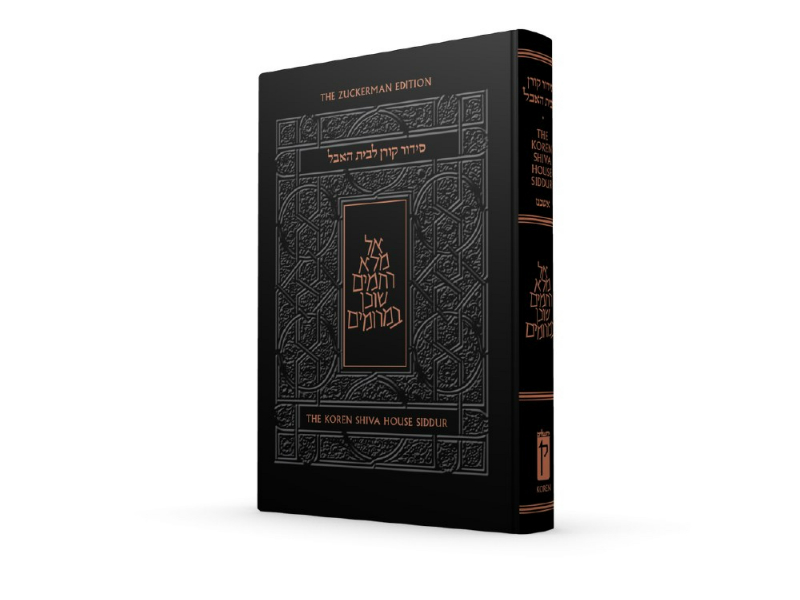It is a truism that people often turn to religion when they lose a loved one. Beginning with prayers at the shivah, Jews often find themselves attending services regularly, even if they never did before.
The people attending services in a shivah house, both the mourners and those who come to comfort them, may be beginners at Jewish prayer. Even people who attend services regularly may feel like beginners, due to the many differences between the prayers recited at synagogue and a shivah house (some prayers are omitted, others are added). Praying from a regular siddur (prayer book) in a shivah house can be a challenge and often requires a lot of page turning.
In 1953, American Conservative Rabbi Morris Silverman (1894-1973) published a prayer book called Prayers and Consolations, which included only those prayers that are recited in a shivah house. Rabbi Silverman is well known for editing prayer books: he was the editor of the Silverman machzor, a prayer book for the High Holidays, as well as one for Shabbat and holidays. Both were widely used in Conservative synagogues for decades. All three works included fine English translations of the prayers.
As a teenager in the 1960s, when I was still learning my way around the siddur, I found Prayers and Consolations very useful. I saw it in most shivah houses in Toronto, even those of Orthodox synagogue members. (At least in its earliest editions, the liturgy was identical to that of Orthodox Judaism. Even the prayers for the restoration of sacrifices, which Conservative Judaism removed or rewrote decades ago, were included in the 1953 edition of Prayers and Consolations.)
Now, Koren Publishers of Jerusalem, which specializes in carefully edited siddurim, has put out The Koren Siddur for the House of Mourning, which was edited by Rabbi Leonard Matanky. The prayers are translated by Rabbi Jonathan Sacks, the former chief rabbi of the United Kingdom. Other admirable features of this and other Koren siddurim include clear instructions, attractive fonts and some small efforts to include women.
The volume is handsome and slim, despite its 600 pages, thanks to its use of thin paper. Its small size is important, since synagogues frequently transport multiple siddurim to shivah houses.
Yet this siddur is three times the length of Prayers and Consolations. The Koren Siddur for the House of Mourning has over 20 pages summarizing the laws of mourning, for example, while Prayers and Consolations has three and a half.
READ: DO HEBREW BIBLE COMMENTARIES WORK IN ENGLISH?
This book also has many sections of Mishnah, because, as the introduction explains, in Orthodox shivah houses, “It has become the custom for a comforter to study Mishnah in the shivah house between Mincha and Maariv (the late afternoon and evening services, respectively) and to apply some of the lessons of the Mishnah to the life of the departed.” The Mishnah is printed with an English commentary by Rabbi Adin Steinsalz that’s taken from a different book published by Koren.
This new siddur also includes a special version of Grace after Meals (Birkat ha-Mazon) for the shivah house, a text that includes several moving lines, such as: “May He who repairs the breaches in Israel, repair this breach in us.” When I sat shivah, I found the recitation of this prayer, one of the only prayers that refers directly to death and loss, very meaningful.
The custom of reciting this different version of grace is, however, not universally observed. In fact, while this siddur has restored it, the editor writes in a footnote that, “The predominant custom is not to use this unique formula, and instead to recite the regular Birkat ha-Mazon,” which is not included in the siddur.
Another significant addition is that this siddur includes the Torah service and the text of all possible Torah readings that could be read in a shivah house. Prayers and Consolations never mentions the possibility of reading Torah in a shivah house. In my recollection, when I first started paying shivah visits in Toronto, it was almost unheard of for the service to include reading Torah. Now it is common.
The change is probably a function of increased affluence, not increased religious devotion. Many synagogues now own a Torah scroll dedicated to shivah houses that’s sent to the home of any member who suffers a loss, along with siddurim and other shivah accoutrements.
What is omitted from The Koren Siddur for the House of Mourning is also telling. Prayers and Consolations included over 30 pages of English readings and meditations related to death and mourning. The Koren Siddur for the House of Mourning includes no supplementary readings.
The decision not to include texts that address death directly is surprising. But Rabbi Matanky explains in his short introduction to the siddur that, “A siddur designed specifically for the house of mourning is (a) source of comfort. Such a volume can help the mourner … to faithfully follow the halakhot of mourning.…
“But more importantly, it enables the mourner to speak with God, to find inspiration and, hopefully, to find comfort and consolation. We are a most fortunate people to have our halakhah to guide us and guide our community to comfort us.”
In other words, for the editors of this siddur, comfort comes from ritual, from the prayers recited, the Mishnah studied and the laws observed, and not from meditations about death, loss or loneliness.







